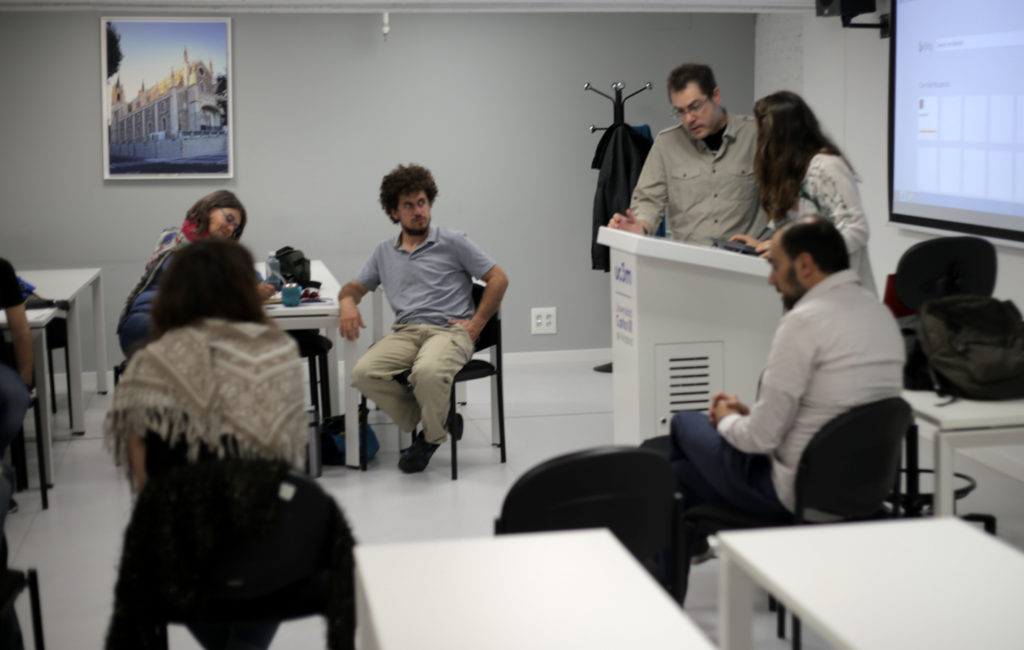Grappling with Alternative Communication: Meditating upon the means and practices of the Third Sector of Communication
This meeting aims to problematize the concept of alternative communication and related notions -citizen, free and community media, outlets for social change, third sector of communication, etc. We start from the premise that this is an extensive and heterogeneous field in which, historically, have lived very diverse experiences according to their objectives, contents, forms of organization and relation with the audiences: free and community radios, fanzines and alternative press, participatory video, technopolitical and hacktivist practices, etc. The dispersion in the area is an endless source of creative labels that try to adapt to the idiosyncrasies of each project. However, denominations are sometimes the subject of controversy, misunderstandings and even difficulties in creating synergies and alliances to deepen into the right for communication. This seminar presents a space for dialogue halfway between academia and activism, in which different kinds of media converge and synthesize the main academic debates in the area.
This meeting links with the actions undertaken in the First Meeting “Alternative Communication Networks. Synergies, Knowledge and Counterpower” held in Matadero Madrid on June 4, 2016 (https://redescomunicacionalternativa.wordpress.com).

From left to right: Gloria Rosique (RICCAP – Carlos III University), Patricia Fasano (Entre Ríos University), Alejandro Barranquero (RICCAP – Carlos III University), Chiara Sáez (Screen: Universidad de Chile) and José Emilio Pérez (Universidad Complutense de Madrid).


Meeting with Argentinian schoolars and communicators: Patricia Fasano (RICCAP Argentina), Víctor Notarfrancesco y Santiago Álvarez (Universidad Nacional de Salta).

From left to right: José Ramón Planelles (Onda Merlín), Ramón Ferrer Prada (Radio Almenara), Izaskun Sánchez Aroca (El Salto) y Griselda Vilar (RICCAP – Universitat Jaume I).

Izaskun y Ramón during the discussion panel: “Alternative communication from the practice’s view”.
ORGANIZER
Research Network on Community, Alternative & Participatory Communication (RICCAP).
COLLABORATORS
Carlos III University of Madrid. Department of Journalism and Audiovisual Communication.
Working Group on Communication and Citizenship of the Spanish Association for Communication Research (AE-IC).
Interuniversity Network of Community, Alternative and Popular Communication (RICCAP) (Argentina).
DATE AND PLACE
UC3M. Campus Puerta de Toledo, Friday 7 and Saturday 8 April 2017
Aula PT-1.A.08; Saturday: PT.0.A.05
From 16 to 19 h.
AIMED AT
Professionals, academics and students, as well as participants and stakeholders in the area of communication for social change or alternative communication. It is recommended that both lecturers and attendees review the questions for the debate as well as the recommended readings in order to rethink their perceptions from concepts and academic debates that prevail in the sector today.
PROGRAMME
Friday, April 7
16 h. Presentation of the Seminar and Discussion table “Alternative communication from the academic reflection’s view”.
- “The third sector of communication since the works of Riccap”, José Emilio Pérez (Universidad Complutense de Madrid) and Alejandro Barranquero (Carlos III University of Madrid).
- “The practice of community communication and university. Towards a dialogue of knowledge “, Patricia Fasano (University of Entre Ríos, Argentina).
- “The surnames of alternative and social change communication”, Chiara Sáez Baeza (University of Chile) – By videoconference.
17.30 – 7.00 p.m. Discussion table “Alternative communication from the practice’s view”.
- Izaskun Sánchez Aroca (El Salto).
- José Ramón Planelles (Onda Merlín Comunitaria y ReMC).
- Ramón Ferrer Prada (Federation of Free and Community Radios of Madrid, ReMC).
19.00-19.15 Conclusions of the meeting.
Saturday April 8
10:00 am Meeting with Argentine academics and communicators.
- Patricia Fasano (former Riccap Argentina president).
- Victor Notarfrancesco (National University of Salta).
- Juan Guzmán (National University of Jujuy) (open to the public and aimed for the internal training of Riccap).
11.00 Annual meeting of Riccap (closed meeting).
Recommended readings
- Barranquero, A. (2011). Comunicación alternativa. Debates, escenarios y redes. Boletín ECOS, 13, 1-15. www.fuhem.es/media/ecosocial/file/Boletin%20ECOS/Boletin%2013/comunicacion%20alternativa_A.%20BARRANQUERO_edit.pdf
- Barranquero, A. (2015). Trayectorias, cruces y diálogos entre la tradición latinoamericana y anglosajona en comunicación comunitaria y ciudadana. Revista Internacional de Comunicación y Desarrollo,1(1), 19-22. www.usc.es/revistas/index.php/ricd/article/view/2360/2484
- Downing, J. (2010). Nanomedios de comunicación: ¿Medios de comunicación comunitarios? ¿O de red? ¿O de movimientos sociales? ¿Qué importancia tienen? ¿Y su denominación?. Conferencia “Medios comunitarios, movimientos sociales y redes”. Cátedra UNESCO de Comunicación InCom-UAB y Fundación CIDOB. Barcelona, 15/03/2010.www.portalcomunicacion.com/catunesco/download/2010_DOWNING_NANOMEDIOS%20DE%20COMUNICACI%C3%93N.pdf
- Rodríguez, C. (2010). De medios alternativos a medios ciudadanos: trayectoria teórica de un término. Folios. Revista de la Facultad de Comunicaciones de la Universidad de Antioquía, 21, 13-25. http://revistaestudiospoliticos.udea.edu.co/index.php/folios/article/view/6416
- Sáez Baeza, C. (2010). Conceptualización y contextualización del tercer sector de la comunicación: aportes al debate legislativo sobre televisión comunitaria en la transición digital chilena. Revista CNTV (Consejo Nacional de Televisión de Chile).
www.cntv.cl/cntv/site/artic/20101129/asocfile/20101129112315/tvdigital_tsc_final.pdf - Servaes, J. y Malikhao, P. (2007). Comunicación participativa. ¿El nuevo paradigma?. Redes.com: revista de estudios para el desarrollo social de la comunicación, 4, 43-60. http://revista-redes.hospedagemdesites.ws/index.php/revista-redes/article/viewFile/116/109
Questions for discussion
- Which terms would you use to define the medium or project from which you proceed and why?
- Do you consider that your project or medium is an alternative means of communication? How do you understand the word alternative?
- Do you consider that your project or medium is a third sector means o communication? What do you understand by this?
- What other denominations do you identify your project with and which ones you do not? Why?
- What other media do you think your project or medium is related to?
- What differentiates your project from other media that are not public or commercial media? What characteristics do you share with them?



